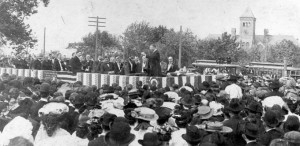Historical perspective on universities and freedom of speech
- Thin Tweed Line by Steve Jackson.
- Medieval Universities And the Origin of the College
- The Medieval University (wikipedia)
- Gabriel Compayré, Abelard and the origin and early history of universities, 1893.
- David N. Portman, The universities and the public : a history of higher adult education in the United States, 1978
- John S. Brubacher, Willis Rudy Brubacher, John Seiler, Higher education in transition : a history of American colleges and universities, 1636-1976
- Joan DelFattore, Knowledge in the making : academic freedom and free speech in America’s schools and universities
- International comparisons re: Freedom of Speech and Academic Freedom
European universities
- Wikipedia notes the history of the European university dates back to 1088.
- Academic freedom was a key concept in early European universities. The idea goes back to University of Bologna adoption of an academic charter, the Constitutio Habita, in 1158 or 1155, which guaranteed the right of a traveling scholar to unhindered passage in the interests of education.
- St. Scholastica Day riots in Oxford lasted two days Feb. 10 – 12, 1355 and left 63 scholars and perhaps 30 locals dead. This was the ultimate “town-gown” confrontation. The students and faculty lost the battle, but apparently won the war, as the longstanding set of disputes was eventually settled in favour of the University. A special charter was created and each year afterwards, on on the anniversary of the riots, the mayor and other officials of Oxford had to march through the streets and deliver a fine of one penny per scholar killed. The penance lasted 470 years.
- Giordano Bruno, a Domincan Friar and mathematician who believed the earth revolved around the sun, apparently thought he was safe at the University of Padua and teaching in Venice, but was denounced to the Inquisition and burned at the stake in 1600.
- Galileo was another university scholar persecuted for astronomical beliefs, although he avoided Bruno’s fate.
History of free speech issues at US universities
- The Bassett Affair In 1903, Duke (then Trinity) University historian John Bassett expressed admiration for Booker T. Washington, a then-famous African American leader, putting him on a par with Robert E. Lee. Outraged politicians demanded that he be fired. Trinity refused, and then-president Theodore Roosevelt came to Trinity to congratulate Bassett in a commencement speech. “You stand for Academic Freedom, for the right of private judgment, for a duty more incumbent upon the scholar than upon any other man, to tell the truth as he sees it, to claim for himself and to give to others the largest liberty in seeking after the truth.”
- University of Texas system, 1917 , governor of Texas http://en.wikipedia.org/wiki/James_E._Ferguson impeached after withholding university budget due to personal animosity against faculty.
- University of Virginia fired its first journalism professor for supporting pacifism in 1917 after the US entered World War I. ““I am a pacifist for the plain, logical reason that war does not work,” said Leon Rutledge Whipple in a speech that was widely condemned in Virginia newspapers. Whipple began teaching journalism at New York University the following year. (UVa Magazine, Spring 2021.)
- Max Meyer In 1929, University of Missouri professor of experimental psychology was dismissed for supervising a study involving questions about sexual conduct which were then considered to be scandalous. The university was censured by AAUP for the dismissal.
- The Red Scare (1940s – 60s) Colleges and schools around the country began requiring loyalty oaths; those who objected were dismissed. (Also see History of UCLA and McCarthyism).
- Free speech movement In 1964 and 1965, students at the University of California Berkeley demanded that the university administration lift a ban on political activities at the campus and acknowledge the students’ right to free speech and academic freedom. Demonstrations started after the arrest of people who were simply passing out pamphlets on the civil rights movement.
- Speech codes created controversy through the 1970s and 80s, exemplified in the Doe v. University of Michigan case in 1989 and the Water Buffalo incidentof 1993, among many others. Other speech codes, for example involving requirements for stamps on posters and approval of off-campus signage for certain student groups continue to be controversial. The Foundation for Individual Rights in Education recently started a rating system for campus speech codes.
- Free speech zones have been controversial in the 1980s – 2010s period. They have been altered or abolished at Tufts University, Appalachian State University, West Virginia University and Penn State University. Controversies have also occurred recently at the University of Southern California, Indiana University, the University of Nevada, Las Vegas,and Brigham Young University, according to this Wikipedia article.
- Student press issues have been contentious and complicated since the 1960s. Major cases on the legal horizon include Hazelwood v Kuhlmeier (1988) for high school press and Hosty (2005) for college press.
- Student protests – Occupy Movement 2011.
- FIRE chapter on history of free speech
- Ward Churchill loses appeal at University of Colorado, Sept. 2012.
- North Texas University fires math professor for critical comments for criticizing the concept of microaggressions “and for refusing to attend extra diversity training to correct his views, which the math department chair deemed “not compatible with the values of this department.” (FIRE, April 27, 2020)



